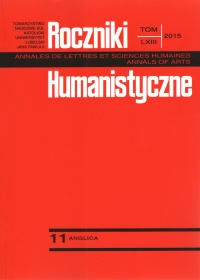Entrepreneurial training in translator and interpreter education
Abstract
One of the leading topics in translator and interpreter education is how to match the educational vision of the educators with that of the market and that of the students. The debate has been going on for more than two decades now, and it seems it is likely to occupy the researchers and practitioners in the nearest future. One aspect of the educational aspirations to make students active and successful players on the Language Service Provision market is entrepreneurship. The aim of this paper is to promote effective operationalization of this concept to help graduates not only find a job, but first of all make them self-directed in significant life choices.
References
Chomsky, Noam. 1965. Aspects of the Theory of Syntax. Cambridge, MA: MIT Press.
EMT. 2009. Competences for Professional Translators, Experts in Multilingual and Multimedia Communication. http://ec.europa.eu/dgs/translation/programmes/emt/index_en.htm [LR: 10.09.2015].
Eraut, Michael. 2000. “Non-formal Learning and Tacit Knowledge in Professional Work.” British Journal of Educational Psychology 70: 113–136.
Gergen, Kenneth. 1985. “The Social Constructionist Movement in Modern Psychology.” American Psychologist 40 (3): 266–275.
Gergen, Kenneth. 2007. “Relativism, Religion, and Relational Being.” Common Knowledge 13 (2–3): 362–378.
Gergen, Kenneth. 2009. Relational Being. Beyond Self and Community. Oxford, New York: Oxford University Press.
Glasersfeld, Ernst von. 2007. “An Exposition of Constructivism:_Why Some Like It Radical.” Available at: http://www.oikos.org/constructivism.htm LR_28.10.2014.
Gouadec, Daniel. 2007. Translation as a Profession. Amsterdam, Philadelphia: John Benjamins Publishing.
Grucza, Franciszek. 1997. “Języki ludzkie a wyrażenia językowe, wiedza a informacja, mózg a umysł ludzki.” In Franciszek Grucza, Maria Dakowska (eds.). Podejścia kognitywne w lingwistyce, translatoryce i glottodydaktyce, 7–21. Warszawa: Wydawnictwo Uniwersytetu Warszawskiego.
Grucza, Franciszek. 2009. “Metanaukowa i metalingwistyczna wizja lingwistyki (stosowanej).” Lingwistyka Stosowana / Applied Linguistics / Angewandte Linguistik 1: 19–39.
Hase, Stewart, Chris Kenyon. 2000. “From Andragogy to Heutagogy.” Available at: http://pandora. nla.gov.au/nph-wb/20010220130000/http://ultibase.rmit.edu.au/Articles/dec00/hase2.htm LR 28.10.2014.
Hase, Stewart, Chris Kenyon. 2007. “Heutagogy: A Child of Complexity Theory.” Complicity: An_International Journal of Complexity and Education 4(1): 111–118.
Jarvis, Peter. 2012. “It Is the Person Who Learns.” In David Aspin, Judith Chapman, and Karen Evans, Richard Bagnall (eds.). Second International Handbook of Lifelong Learning. Vol. 1, 103–111. Dordrecht: Springer.
Kelly, Dorothy. 2005. A Handbook for Translator Trainers. A Guide to Reflective Practice. Manchester: St. Jerome.
Kiraly, Donald. 2000. A Social Constructivist Approach to Translator Education. Empowerment from Theory to Practice. Manchester: St. Jerome Publishing.
Kiraly, Donald. 2012. “Growing a Project-Based Translation Pedagogy: A Fractal Perspective.” META 57 (1): 82–95.
Kiraly, Donald. 2013b. “Towards a View of Translator Competence as an Emergent Phenomenon: Thinking Outside the Box(es) in Translator Education.” In Donald Kiraly, Silvia Hansen-Schirra, and Karin Maksymski (eds.). New Prospects and Perspectives for Educating Language Mediators, 197–223. Tübingen: Gunter Narr Verlag. (Translationswissenschaft 10).
Klimkowska, Katarzyna. 2013. Orientacja na sukces zawodowy studentów kończących studia translatorskie. Lublin: Wydawnictwo Uniwersytetu Marii Curie-Skłodowskiej.
Klimkowska, Katarzyna. 2014. “Entrepreneurial Potential of the Students of Applied Linguistics Programme, Majoring in Translation.” Academic Journal of Modern Philology 3: 17-26.
Klimkowski, Konrad. 2010. “Non-Formal Elements in Academic Translator Education.” In Barbara Lewandowska-Tomaszczyk, and Marcel Thelen (eds.). Translation and Meaning. Part 10, 211–220. Maastricht: Hogeschool Zuyd, Maastricht School of Translation and Interpreting.
Klimkowski, Konrad. 2012. “Elementy pozaformalne w akademickim kształceniu tłumaczy.” Roczniki Humanistyczne KUL 60 (5): 147–159.
Klimkowski, Konrad. 2015a. Towards a Shared Curriculum in Translator and Interpreter Education. Wrocław-Washington DC: Wydawnictwo WSF we Wrocławiu, PAN o. we Wrocławiu, International Communicology Institute.
Klimkowski, Konrad. 2015b. “Specjalista językowy jako przedsiębiorca: implikacje edukacyjne.” In Magalena Sowa, Maria Mocarz-Kleindienst, and Urszula Czyżewska (eds.). Nauczanie języków obcych na potrzeby rynku pracy, 163–174. Lublin: Wydawnictwo KUL.
Nord, Christiane. 1996. “Wer nimmt denn mal den ersten Satz? Überlegungen zu neuen Arbeitsformen im Übersetzungsunterricht.” In Angelika Lauer, Heidrun Gerzymisch-Arbogast, Johann Haller, and Erich Steiner (eds.). Translationwissenschaft im Umbruch. Festschrift für Wolfram Wilss, 313–327. Tübingen: Gunter Narr Verlag.
PACTE. 1998. “La competencia traductora y su aprendizaje: objetivos, hipótesis y metodología de un proyecto de investigación.” Poster, IV Congrés Internacional sobre Traducció. Bellatera (Barcelona): Universitat Autònoma de Barcelona.
PACTE. 2003. Building a Translation Competence Model.” In Fabio Alves (ed.). Triangulating Translation. Perspectives in Process Oriented Research, 43–66. Amsterdam, Philadelphia: John Benjamins Publishing..
PACTE. 2014. “First results of PACTE group's experimental research on translation competence acquisition: The acquisition of declarative knowledge of translation.” In Ricardo Muñoz Martin (ed.). Minding Translation = Con la traddución en mente. MonTI Special Issue 1. 85-115.
Pym, Anthony.2003. “Redefining Translation Competence in an Electronic Age. In Defence of a Minimalist Approach.” META 48/4: 481−497.
Pym, Anthony. 2013. “Translation Skill-Sets in a Machine-Translation Age.” META 58 (3): 487–503.
Schön, David. [1983] 2002. “From Technical Rationality to Reflection-in-Action.” In Roger Harrison, Fiona Reeve, Ann Hanson, and Julia Clarke (eds.). Supporting Lifelong Learning. Vol. 1: Perspectives on Learning, 40–61. London, New York: Routledge Falmer [originally published as a chapter in The Re-flexive Practitioner: How Professionals Think in Action; 21–69].
Vienne, Jeanne. 2000. Which Competences Should We Teach to Future Translators, and How? In Christina Schäffner, and Beverly Adab (eds.). Developing Translation Competence, 91–100. Amsterdam, Philadelphia: John Benjamins Publishing Company.
Copyright (c) 2015 Roczniki Humanistyczne

This work is licensed under a Creative Commons Attribution-NonCommercial-NoDerivatives 4.0 International License.





